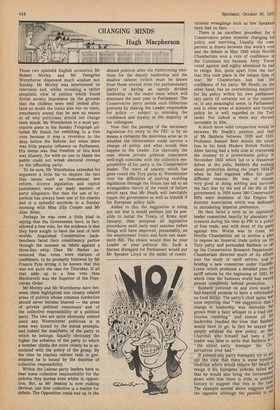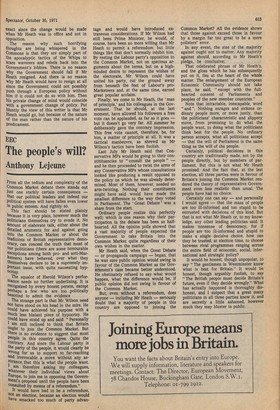CHANGING MINDS Hugh Macpherson
Those two splendid English eccentrics Mr Robert Morley and Mr Peregrine Worsthorne dispensed much wisdom last Sunday. Mr Morley was interviewed on television and, whilst revealing a rather simplistic view of politics which found Soviet society impressive on the grounds that the children were well looked after (and no doubt the trains also run on time), trenchantly stated that he saw no reason at all why politicians should not change their minds. Mr Worsthorne in a most perceptive piece in the Sunday Telegraph pilloried Mr Heath for switching to a free vote because it was a reversion to the days before the Reform Act when there was little popular influence on Parliament. His thesis was that freedom of this kind was illusory, for with no one to blame the public could not wreak electoral revenge on the offending party.
To be sure, Mr Worsthorne extended his argument a little far to deplore the fact that issues such as homosexual law reform, divorce legislation and capital punishment were not made matters of party allegiance. But then the use of hyperbole has always been one of his charms and is a splendid antidode to a Sunday morning with Miss Jilly Cooper and Mr Alan Brien.
Perhaps he was even a little kind in saying that the Government have, in fact, allowed a free vote, for the evidence is that they have sought to have the best of both worlds. Anguished Conservative backbenchers faced their constituency parties through the summer as rebels against a three-line whip. Then Mr Barber announced that votes were matters of confidence, to be promptly followed by Mr Francis Pym letting it be known that this was not quite the case for Thursday. If all that adds up to a free vote then Machiavelli was the Superior of the Franciscan Order.
Mr Morley and Mr Worsthorne have between them highlighted two closely related areas of politics whose common borderline should never become blurred — the areas of private political conscience and of the collective responsibility of a political party. The two are quite obviously related since any Westminster politician is in some way bound by the stated precepts, and indeed the manifesto, of the party to which he belongs. Equally obviously the higher the echelons of the party to which a member climbs the more closely he is associated with the policy of the group. By the time he reaches cabinet rank in government he is bound by the doctrine of collective responsibility.
Within the Labour party leaders have to bear some collective responsibility for the policies they pursue even whilst in opposition. But, as Mr Jenkins is now making obvious, just how collective is a matter for debate. The Opposition could end up in the absurd position after the forthcom ng elections for the deputy leadership and the shadow cabinet (which must be drawn from those elected from the parliamentary party) of having an openly divided leadership on the major issue which will dominate the next year in Parliament. The Conservative party avoids such Gilbertian postures by making the Leader responsible for policy — subject to retaining the confidence and loyalty of the majority of his colleagues.
Now that the passage of the necessary legislation for entry to the EEC is by no means a certainty the questions arise as to whether the Government could survive a change of policy and what would then happen to the Leader. For obviously the man whose private political conscience well-nigh coincides with the collective responsibility of his party is the Conservative leader. The wave of anxiety which has gone round the Tory party at Westminster over the difficulties of pushing enabling legislation through the House has led to an Armageddon theory of the result of failure which says that Mr Heath will inevitably topple the government as well as himself if his European policy fails.
Added to this the suggestion is being put out that it would perhaps just be possible to initial the Treaty of Rome next January, then postpone all legislative procedures until early next summer (when things will have improved, presumably, on the employment front) and have one mammoth Bill. The choice would then be your Leader or your political life. Such a blatant disregard for Parliament would put Mr Speaker Lloyd in the midst of consti tutional wranglings such as few Speakers have had to face.
There is an excellent precedent for a Conservative prime minister changing his policy and surviving. Usually the com parison is drawn between this week's vote and the debate in May 1940 when Neville Chamberlain won a vote of confidence in the Commons but because forty Tories voted against and eighty abstained he had to resign. But, quite apart from the fact that this took place in the unique time of war, Mr Chamberlain had lost the confidence of his party. Mr Heath, on the other hand, has an overwhelming majority for his policy within his own parliamentary party (if certainly not in the country or, in any meaningful sense, in Parliament) and in other areas of domestic and foreign policy he is well regarded in the Tory ranks. Nor indeed is there any obvious successor to him.
A much more valid comparison would be between Mr Heath's position and that of Mr Baldwin between 1929 and 1931. Professor Samuel Beer details the situa. tion in his book Modern British Politics. After having had a bold stab at converting the country to a protectionist policy in November 1923 which led to a disastrous defeat at the polls, Baldwin did nothing about protection during the years 1924-29 when he had regained office for quite different reasons. He was, of course, very good at doing nothing and survived the fact that by the end of the life of the government in 1929 some 280 Conservative MPs were members of the Empire In' dUstries Association which was dedicated to introducing imperial preference.
He then faced a term as an opposition leader committed heavily by placatory ut' terances during his time as PM to a policY of free trade, and with most of his partY against him. Worse was to come, for Neville Chamberlain set in motion a plas to impose an Imperial trade policy on the Tory party and persuaded Baldwin to set up the Conservative Research Department, Chamberlain directed much of its efforts into the study of tariff reform, and t° briefing a new committee under Cunliffe' Lister which produced a detailed plan for tariff reform by the beginning of 1931, bY which time the business world had swung almost completely behind protection. Baldwin pottered on and even made 8 half-hearted promise to have a referenda on food duties. The party's chief agent WO soon reporting that "the suggestion that s change in leadership was desirable hos grown from a faint whisper to a loud CO"' tinuous rumbling" and almost all the leadership reached the view that Baldvii! would have to go. In fact he stayed an': simply adopted the new policy, so OS' Churchill who himself had been a free; trader was later to write that Baldwin No" "the ablest party manager the COservatives ever had." If present-day party managers try to Put out the view that there is some mystic°, tradition which would require Mr Heath td resign if his European policies failed arIt that he would also bring the Governmen, down with him there is little in politic!' history to suggest that this is the caSfe The example quoted above suggestsclut„Lt the opposite although the parallel is nu
exact since the change would be made When Mr Heath was in office and not in Opposition.
The reason why such horrifying thoughts are being whispered in the Commons is that they are simply part of the apocalyptic tactics of the Whips to scare waverers and rebels back into the Government's lobbies. There is no reason Why the Government should fall if Mr Heath resigned. And there is no reason Why Mr Heath would have to resign at all since the Government could not possibly Push through a European policy without him if it could not do so with him. Then his private change of mind would coincide With a government change of policy. Put bluntly the view of this writer is that Mr Heath would go, but because of the nature of the man rather than the nature of his predicament.



































 Previous page
Previous page